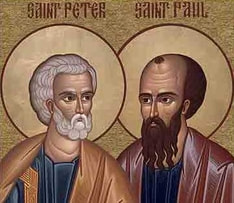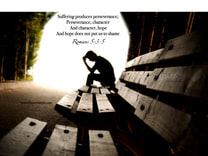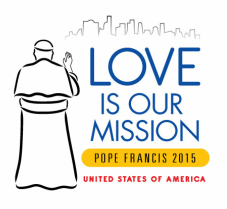 Yesterday, we celebrated the Solemnity of Sts. Peter and Paul, which gives the faithful the opportunity to reflect on many different subjects. For instance, it is on this feast that the Pope traditionally presents the pallium to newly installed metropolitan archbishops, signifying their union with the Holy See. The feast is also important for the ecumenical movement because it is on this day that leaders of both the Catholic and Orthodox churches come together to pray and work towards full communion. However, one theme that seems to be missed is that of God’s mercy as exemplified by the lives of these two leaders of the early Church. And with the Jubilee Year of Mercy upcoming, one might want to look to these great saints for some inspiration. One of the most well-known moments of the Passion is when Peter denies Christ three times (Mt 26:69-75) even after promising Jesus that, “though all should have their faith shaken, mine will not be” (Mk 14:29). Likewise, Paul also denied Jesus by his persecution of the disciples. He even takes part in the death of the first martyr, St. Stephen (Acts 7:58-60). If their stories had stopped there, we might judge the first as a fare-weather follower and the second as a ruthless fanatic. Yet, we know that is not how the story ends. In the Gospel of John, Jesus appears to his disciples as they are fishing. They are eating breakfast on the shore when Christ asks Peter three times, “Do you love me?” to which Peter replies yes twice and at the third time says, “Lord, you know everything, you know that I love you” (Jn 21:15-17). And thus, Peter is redeemed and given the charged by Jesus to “Feed my sheep.” He becomes the leader of the early church and by tradition is regarded as the first pope. On his way to Damascus, Paul sees a bright light from the sky and voice crying out, “Saul, Saul, why are you persecuting me?” (Acts 9:4). The voice is revealed to be that of Jesus himself. Blinded by the light, Paul enters Damascus when one of Jesus’ disciples, Ananias, lays his hands on him at the Lord’s command. Upon doing so, Paul’s vision is regained, is baptized, and goes on to preach the Gospel throughout the Mediterranean. Pope Benedict XVI reminds us that, “The Church is not holy by herself; in fact, she is made up of sinners…Rather, she is made holy ever anew by the Holy One of God, by the purifying love of Christ.” Similarly, Pope Francis recalls, “[God] never tires of forgiving, but at times we get tired of asking for forgiveness…He is the loving Father who always pardons, who has that heart of mercy for us all.” The lives of Sts. Peter and Paul show us that no one is beyond forgiveness, so long as he or she seeks the mercy of God. Therefore, these two great pillars of the Church are a great reminder to have as we approach the Jubilee Year. Victor David is a staff member at The Catholic University of America in Washington, D.C.
0 Comments
This past weekend, I had the honor of attending a beautiful wedding for a couple I have known since my freshman year in college. The two had a lovely Mass followed by a fun reception, and many college-friends and family were there to celebrate them. These two were not the first couple I’ve seen get married this year, and they won’t be the last - in fact, I have 4 more to attend in the next year already! It all got me thinking about how these men and women are such amazing examples of love and devotion for those of us around them.
As millennial Catholics, we have many people to influence us or to learn from, especially in this digital age of constant communication. Our peers who are getting married set a new model for us to follow. These peers are examples of commitment and true love, and are models for us as we discern our own vocation in life. Sometimes, it seems like “everyone” is getting married, and it’s “cool” to have a perfectly Pinterest-ed wedding. We also get pressure from others who note that “It’s that time in your life”. But, there is so much more to the sacrament of marriage than having a trendy reception in a fancy venue. The example of love that we see from those around us can help us look deeper at the love that we, too have with others. Marriage at any age is a testament to the selflessness and devotion that one person gives to someone else. In the midst of a culture built on so much focus on the individual, it is joyful and inspiring to me for to see so many people devote themselves to another person and to God through the sacrament of Holy Matrimony. But it doesn’t stop there! People who are not married, engaged, or still dating still also can follow the example of love given to them by their peers by focusing on their love of God and strengthening their bond and relationship with Him. The single life can be even more of a beautiful and fruitful time for those who serve the Lord. It is a time to build a stronger prayer life, spiritual life, and overall well-being. Discerning the will of God has always been a struggle for people, for instance in Romans 12: 1-2, 9-13, Saint Paul asks the Romans to be selfless and good in their daily lives, his letter still speaks to us today, saying: "I urge you, brothers and sisters, by the mercies of God, to offer your bodies as a living sacrifices, holy and pleasing to God, your spiritual worship. Do not conform yourselves to this age but be transformed by the renewal of your mind, that you may discern what is the will of God, what is good and pleasing and perfect. […] Let love be sincere; hate what is evil, hold on to what is good; love one another with mutual affection; anticipate one another in showing honor. Do not grow slack in zeal, be fervent in spirit, serve the Lord. Rejoice in hope, endure in affliction, persevere in prayer. Contribute to the needs of the holy ones, exercise hospitality.” Millennials like myself are always trying to change things and improve on the old, so this should be an easy task for us: build-on and improve our prayer life and relationships with God. Let us try to find a new and more invigorating way of serving God and others! While many are called to marriage when they answer their own vocation call, others may try a path of holy orders or religious life to improve their personal relationship with God, and still more may just remain open to God’s will for them in their lives each day. Krissy Kirby is a teacher for the Archdiocese of Washington, D.C.  Back in 2002, my 8th grade religion teacher assigned my class the task of choosing a saint for Confirmation and then writing about why we chose the person. After deciding that I would research a patron of lawyers and politicians, I came across a name: St. Thomas More. He seemed like an interesting person whose work and faith were integral in his life. His feast day is on June 22, and his life and personality can offer us something to apply to ourselves today. After researching his life, seemed even more interesting to me, primarily because of how history and faith intertwine in his life. A brief history on him: St. Thomas More was Chancellor to Henry VIII and a personal friend. He was a devout Catholic and criticized the King about his divorce from his first wife, Catherine of Aragon. This was treason, but he was willing to put aside friendship and his life for his convictions, and was not harmed. But, when Henry VIII declared himself the head of the Church of England, separating himself from the papacy, all in the government were to sign signifying their agreement to this act. Thomas More refused. Because of this blatant act of treason, Thomas was imprisoned in the Tower of London and eventually executed along with Bishop John Fisher on July 6, 1535. In both the Anglican and Catholic liturgical calendars, he is celebrated as a saint for his willingness to being martyred for his faith. Thomas More is considered to be a “Man for all Seasons” because of his ability to be a philosopher, politician, lawyer, devout Catholic, and loving father of 4 children. The man was considered a model civil politician in English Parliament and respected by some of his most hated rivals for his integrity. It was due to his integrity that he was martyred. Can we willingly give our lives due to our personal integrity and unwillingness to move away from what faith teaches us? Are we willing to deal with the ridicule and criticism for our beliefs? Thomas More was a person of such integrity that he was willing to die instead of lie and go against his beliefs. St. Pope John Paul II considered him such an important and needed saint for the 21st century that he declared him the patron saint for political leaders. Thomas More’s civility and statesmanship should serve as a reminder for those in political office. Despite differences that people may have with each other as politicians, love and respect of those with different viewpoints is imperative. Thomas More was one who disagreed with many, but was always willing to work with others and be a truly welcoming and hospitable person. It is my hope every time that I ask for the intercession of St. Thomas More that I and all those who care about political life are willing to listen to those we disagree with and still love the person. It is a difficult task, but with the assistance of the saints, such as Thomas More, we can work for the betterment of society together. Jonathan Sitko is the Program Manager of the Catholic Apostolate Center.
Let’s face it, trudging along in our daily lives can be dull sometimes. One must try, even if the thought is just a curious leap of the soul, to remove oneself from the business of the world and to look up at the sky. We must look up in the sky toward a marvelous sight, the light that propels life on this earth, the face of the creation, and the Creator of beauty.
In all areas of darkness, light abounds brighter than ever. In all things, we exist and share in our lives with our Creator. Everything we do is profound in its own small way. Everything that happens, happens with and for a purpose, with and for a cause, ever meaningful and ever present in our lives. Our lives are living, never truly dying. We will always have the light to look toward. The hope that always lets us know we are never truly alone in anything we do. We must rise into the light in this very moment. This is what the fires of Pentecost are about. We must remember to put action into the journey of the disciple in sharing the truth and love of God in the world. It is waiting for the passions of our own lives to pass and form into one focus of love, pure and true. We are waiting for love, preparing for love, being there for love, attending to love, sacrificing for love, yet we must always remember that we ARE Love. We, as beautiful reflections of the heart of God can illuminate the darkness not only in our own lives, but in others as well. We can be beacons of light, shining bright for others to see. Light is what draws us to the Heavens on a day with a clear sky. It is what makes us wonder at the millions of stars bursting in radiance in the night. It is what can illuminate any darkness no matter how small the flame may be. The light we see in the Sacraments passing from Christ into His people is nothing short of a miracle. The light we witness on the Cross, expelling all sin and darkness from our twisted up hearts, brings us closer to the very nature of love, the deepest kind of love, the love of Christ. In Him I see my guiding Light and my strength to carry on each and every day of my life. He is my starlight in the dark of the sky, letting me gaze of his majesty. In everything, there is light. It is truly present infinitely in our universe. There is a place for us in the skies with the Father, for we, in this world, will rise a stronger people, ready to take up the mission of light, the mission of love, and the mission of hope for all who are searching for something, anything that can fulfill a restless heart. William Clemens is an Undergraduate Student of Theology & Religious Studies at The Catholic University of America in Washington, D.C. Be sure to check out Pope Francis' latest encyclical, Laudauto Si, and visit the Catholic Apostolate Center's Laudato Si Resource Page! “…we even boast of our afflictions, knowing that affliction produces endurance, and endurance, proven character, and proven character, hope, and hope does not disappoint, because the love of God has been poured out into our hearts through the Holy Spirit that has been given to us.”
Romans 5:3-5 A few weeks ago, during our celebration of the Solemnity of the Most Holy Trinity, this portion of St. Paul’s letter to the Romans was read to faithful Catholics throughout the world. I had the privilege of attending a bilingual Mass that weekend with my girlfriend, Kara, in a high school gymnasium. The different setting, unfamiliar language, and unusually large number of altar servers hardly crossed my mind as we participated in Mass at Most Holy Trinity Parish, on this, their solemnity. It was a beautiful liturgy to say the least! What struck Kara and me most about our experience, however, were these lines from the second reading: How many of us know someone who is afflicted? We all have family members, friends or colleagues that are struggling with cancer, unemployment, depression, etc. In the daily news - local, national and international - we hear about gun violence, war, natural disaster, and famine. Even more simplistically, we each have ‘good days’ and ‘bad days.’ St. Paul reminds us that affliction is not something to run from because ultimately, we “boast in hope of the Glory of God” (Romans 5:2). His ‘flow chart of hope’ is a reassuring message of what true faithfulness yields and how God makes His love present to each of us in our struggles. The alternatives to hope (sin, despair, discouragement, impatience, fear, anxiety, guilt…)_ when left unchecked, are a rejection of God’s invitation to deeper communion with Him. Very basically, this reading offers us a roadmap to understand how affliction does not have the final word; hope does! Pope Benedict XVI’s homily at Nationals Stadium during his 2008 Apostolic Visit to the United States speaks to this point: “It is a prayer of unfailing hope, but also one of patient endurance and, often, accompanied by suffering for the truth. Through this prayer, we share in the mystery of Christ’s own weakness and suffering, while trusting firmly in the victory of his Cross.” We are able to endure our own afflictions because of the hope promised to us by God. Pain, suffering, and struggle are not pleasant, especially when they are affecting someone we know and love. As people of faith, though, we believe God is with us, united in our affliction and made present to us in the love we experience. This faith, this hope, and this love, offer us momentary comfort and strength as we journey to the ultimate glory of complete communion with God. We have a common call to share this hope with those around us, especially with those who find it difficult to endure in times of struggle. This simple reminder of the universality of the Church also reminds us that through prayer, “we become capable of the great hope, and thus we become ministers of hope for others” (Spe Salvi, 34). And so, as we are confronted with affliction, our prayer should be one of hope. As others struggle with affliction, our response should be one of hope. And as we begin to question why affliction affects our lives, we must remember that affliction yields hope; hope in the love of God. “Hope, O my soul, hope. You know neither the day nor the hour. Watch carefully, for everything passes quickly, even though your impatience makes doubtful what is certain, and turns a very short time into a long one. Dream that the more you struggle, the more you prove the love that you bear your God, and the more you will rejoice one day with your Beloved, in a happiness and rapture that can never end.” St. Teresa of Avila, The Exclamations of the Soul to God, 15:3. Jonathan Jerome is the Director of Catholic Campus Ministry at the University of Pittsburgh Johnstown. Editor's Note: This post was originally published on June 13, 2013 “The month of June is singled out, in a particular way, for the devotion to the Sacred Heart of Jesus. To celebrate the Heart of Christ means to turn toward the profound center of the Person of the Savior, that center which the Bible identifies precisely as his Heart, seat of the love that has redeemed the world. If the human heart represents an unfathomable mystery that only God knows, how much more sublime is the heart of Jesus, in which the life of the Word itself beats. In it, as suggested by the beautiful Litanies of the Sacred Heart that echo the Scriptures, are found all the treasures of wisdom and science and all the fullness of divinity.”
-St. Pope John Paul II, on the Solemnity of the Most Sacred Heart of Jesus, June 24, 2002. Tomorrow, June 12th, is the Solemnity of the Most Sacred Heart of Jesus. There are many pious devotions to the Sacred Heart which are worthy of practice. Since it is impossible to do justice to them all in just five hundred words, just three of the 33 invocations from the Litany of the Sacred Heart of Jesus (which St. Pope John Paul II described as “beautiful”) will be the focus here. Don’t limit yourself to the brief snippets here! If you pray the Litany in its entirety, you might find an invocation which best speaks to your own prayer life. “Heart of Jesus, full of goodness and love, have mercy on us.” Can you think of a powerful example of love and goodness? Maybe you think of Mother Teresa and her care for the poorest of the poor. Maybe Saint Maximilian Kolbe, who was willing to die in the place of a stranger at Auschwitz so that the man’s children would still have their father comes to mind. There are many touching, beautiful examples of real love and compassion in the world. The love and goodness of Jesus surpasses them all; His love extends to us all, even when we fail to love Him in return. “Heart of Jesus, obedient to death, have mercy on us.” Jesus has a very difficult cross to bear. Before He picked up His cross (literally), He knelt praying in the garden of Gethsemane. Although He prayed that the task might be taken away from Him, in the same breath, He reconciled Himself to the Father’s will (Mt 26:39). Jesus followed the Father’s will because He loves each one of us. Each of us have much smaller crosses to carry; relatively few of us in the United States will be asked to give our lives for our faith. It is easy to grumble when difficulties come along; I myself, like most of us, often fall into that trap. Jesus resigned Himself to the Father’s will so that we might be saved. He wants to give us the graces we need to do the Father’s will, just like He did. “Heart of Jesus, source of all consolation, have mercy on us.” In your most sorrowful moments, where do you turn to for comfort? A close friend or family member? A beloved pet? Chocolate? In times of sadness, there are few things more comforting than a hug from someone you love. Jesus’ heart is overflowing with love for you and He is there with outstretched arms ready to wipe away your tears. You would be hard pressed to find a better listener or someone who loved you more than Him. The Solemnity of the Most Sacred Heart is also the World Day of Prayer for the Sanctification of Priests. If you have a few extra moments to spare tomorrow, remember to say a prayer for the priests in your parish and any other priests who have touched your life! Jennifer Beckmann is an Administrative Secretary for the United States Conference of Catholic Bishops. For more information on Prayer life, please see our Prayer and Catechesis Resource Page! [Jesus] said to [the disciples], “Let the children come to me. Don’t stop them! For the Kingdom of God belongs to those who are like these children. I tell you the truth, anyone who doesn’t receive the Kingdom of God like a child will never enter it.” Then he took the children in his arms and placed his hands on their heads and blessed them.
(Mark 10:14-16) I’m sure many of you have heard of this passage before, and how Jesus especially loves children. Since August 2014, I have been surrounded by little humans age 2 to 5 (“5 Things 5 Year-Olds Teach You” rolled better than “5 things 2 to 5 Year-Olds Teach You”). I serve as an assistant teacher for a preschool classroom at Mercy Neighborhood Ministries in Philadelphia, and I wonder if Jesus knows… I wonder if Jesus knows the horror my troublemaker places in my heart as I yell at him from across the classroom to stop swinging between the chairs, only to watch him in slow motion – first ignoring me with a wide grin as he looks straight in my eyes, then slipping and falling face first onto the tile floor. A second of cold silence hangs in the air for him to fill up his little lungs, then the loudest wail ever snaps everything back to life as he looks up at me with tears and bloody lips. Or how they test my patience every day with their sassy “No!”s, and doing the exact opposite of what I ask them to do. Or what little germ sacs they are, touching everything and anything, and putting their bacteria culture hands straight on me (I must say, my hand-washing habits have improved significantly since I started working with them). So exactly why does Jesus love these disastrous little humans so much? Well, they are so irresistibly cute that it’s easy to forget about their mischief. On a more serious note, they somehow shine God out of their little bodies and bring His desires alive to the present, to the now in my life. So here are five things I learned through my kids. *Names of the students have been replaced with a pseudonym for confidentiality. 1. Eyes for the “small things” “Miss Graaaaace, I have a booboo on my finger.” “Oh no, let me see. Where is it?” “Right here.” “Where??” “Right hereeee.” And there it is, an itsy bitsy red dot you could barely see with naked eyes. “Can I have a band-aid please?” “Oh, I don’t think you need a band-aid for that.” “BUT IT HUUURTSSSS. PLEASEEEEEEEE.” I’ll be honest. When this happens – several times a day – I get a bit annoyed, and I give them a band-aid more for my sake than theirs. But their little eyes that notice their little booboo’s are also the first to notice little cuts or scratches on me that I didn’t even know about. They stare at my tiny wound for a good while, and ask in a soft voice filled with concern, “Are you okay, Miss Grace? Does that hurt a lot?” In that moment, I could not feel any more cared for. And I think God intended for everyone to feel that way. 2. Life is full of little cheering things! One day, we passed out tiles of various colors and shapes to each student for a lesson on patterns and shapes. As I was walking past Cole, I casually asked him what color was his tile. It took him a second to realize that it was “ORANGEEEE!! MY FAVORITE COLOR!!!”. He was so joyous that he literally couldn’t contain it in himself and jumped out of his chair. Replace this orange tile with just about anything at any given moment. I recently saw an article that said preschoolers laugh about 300 to 400 times a day, while adults only laugh an average of 17.5 times. Catherine McAuley, the founder of Sisters of Mercy, wrote in one of her many letters, “I would like to tell you all the little cheering things that God permits to fall in our way”. It is often easy to fall into a trap of finding daily routine repetitive and fatiguing. To combat this, I began to look out for little cheering things throughout my day to find more joy and gratitude. My goal is to get as good as my kids. 3. Transformation is possible “Repeat after me, okay? Es, aitch,” I say as I point at the letters on his paper with the tip of a pencil. “Es, aitch.” “Ey, double yoo, en.” “Ey, double yoo, en.” “Good. Now can you spell your name by yourself?” I anxiously ask Shawn. “Deeeee…” “No, no, no, which letter does your name start with?” “I don’t know,” answers squirmy Shawn with a half-embarrassed, half-playful smile. It is beyond my understanding. We just went over how to spell his name about thirty times, if not more. And every single time, he fails to remember these five letters. What is more frustrating is that we have been doing this every day for several weeks now. With my hopes crushed and patience stretched thin, I wonder if I can ever help Shawn learn how to spell his name. Then one day, I hear Shawn spelling his name all by himself. Surprised, I walk over to his table and I ask him to repeat it. With his eyes full of smile, he proudly recites his name out loud. In the next few weeks, he starts writing his name with backward S’s and a couple of letters missing, and in another few weeks, he can write his whole name by himself. Shawn is not the only one who has shown me that transformation is possible. LayLay, who has given me the opportunity to change diapers for the first time ever in my life, is now completely potty-trained and Pampers free. My little two-year olds who started off the school year unable to speak anything are now calling me “Mitt Gwayth” and defiantly yelling “NO!” when I ask them to do something that doesn’t suit them. Sometimes I miss the good old days when they just sat quietly, but whenever I watch them talk to each other, I am in awe. My kids assure me that slowly, but surely, transformation takes place. I have no doubt that every one of my students has the potential to transform and do what they dream of, and become whoever they want to be. It is so easy to believe that. So why is it so hard for so many of us to believe in ourselves and in each other? Because I’m sure God feels the same way about us as I do about my kids. 4. How well God knows us I have come to know my students by more than just their name. I know their parents, grandparents, siblings, cousins, aunty, uncle, and godparents. I know what backpack, folder, jacket, shoes, sweater, hat, gloves, and scarf each of them have. I decipher their little whispering voices and call them out by name with my back turned toward them. I can tell which crooked handwriting belongs to which kid. Each child gets the same blanket to sleep with every day. I know who has asthma, who is lactose-intolerant, and who simply doesn’t like to drink milk. The list goes on and on. Now, just imagine how much better God must know us if I got to know my students this well in just a few months. 5. How to welcome Hands down, my favorite time of the work day is walking into the dining hall in the early morning when the kids are eating breakfast. They greet me by flying out of nowhere to give me (or my leg) a tight hug and looking up at me with a wide smile as if my appearance is the best thing that had happened to them so far in the day. Every morning, no exceptions. From the very first day, my kids had no inhibition in expressing this kind of welcome towards me. Here I am, a complete stranger, not to mention the only Asian in the whole day center, and my kids either don’t notice it or don’t care. Caring less about creating barriers between us and them with external differences – socioeconomic status, age, religion, sexual orientation, race, and whatever else – and caring more about welcoming others into my life with mercy is what I’m aiming to grow in during this year of service and beyond. We may not be able to stop grey hair from sprouting out (which is increasingly becoming my problem), or be blessed with turbo speed metabolism and unending supply of energy. But we can all still be a kid at heart, right? This post was originally written and posted on the Catholic Volunteer Network Blog. For more Catholic Volunteer Blog Posts please visit the CVN Blog Page. The Catholic Apostolate Center is proud to partner with the Catholic Volunteer Network by developing faith formation resources for volunteers and alumni, assisting in its efforts to provide and advocate for faith-based volunteerism and collaborate in many additional ways. I am going to begin this post with a familiar teaching: “The Eucharist is ‘the source and summit of the Christian life’” (CCC 1324). Christ divinely instituted this Sacrament at the Last Supper, ordering the disciples to continue that Sacrifice “in remembrance of [Him]” (Luke 22:19). For those who believe in the Real Presence of Christ in the Eucharist, it unites earth and heaven, the “communion in the divine life and that unity of the People of God by which the Church is kept in being” (CCC1325). Even for those who do not believe, Christ died for all, though not all choose to avail of the redemption won for them by the shedding of His blood.
I can think of no better reminder of that last point than the traditional Eucharistic procession celebrating the Solemnity of The Most Holy Body and Blood of Christ, also known as Corpus Christi. There is no other liturgical feast during which the Blessed Sacrament is venerated outside of a church. To the passers-by, the procession is impossible to miss: scores of altar servers dispensing clouds of incense and, if you’re lucky, a Knights of Columbus color guard with drawn swords precede an elaborate tent being carried over a golden monstrance elevated by the priest (dressed in beautiful liturgical vestments, no less) while the faithful bring up the rear singing Eucharistic hymns. This spectacle is not merely ecclesiastically pleasing to the eyes, but, among other functions, introduces Christ to the world outside of the Church. In the Eucharist, we recall the words of Christ now repeated by the priest: “Take this, all of you… this is my Body… this is… my Blood, the Blood of the new and everlasting covenant, which will be poured out for you and for many for the forgiveness of sins” (it should be noted that “for many” refers to all who come to believe and not an exclusion/denial of others). The Church does not wish to deny anyone an encounter with Christ but instead continually seeks to evangelize the world. The Eucharistic procession, then, is an invitation extended by the faithful to bystanders to reciprocate the infinite love God has always shown to them, whether it is recognized or not. This invitation may not be immediately accepted, but, given time and the right conditions, the seeds planted in their minds could result in conversion and the desire to join Christ’s body, the Church (see 1 Corinthians 12:12-27). The Solemnity also reminds me of the call to continuing conversion, the universal call to holiness. Each of us who bear the name “Christian” are to become more like the One whom we love and in whom we live— we are called to become what we consume. Christ comes to dwell within us; we live our lives now in Him. We are “living monstrances”, enthroning the Lord in our hearts and showcasing Him through our good works. The same Divine Host that we receive in this Sacrament is the same elevated in the procession. Processing outside of the walls of church serves to proclaim that Christ continues to come into the world through the Church. Our Lord dwells in each of us by virtue of our Baptism. We carry Him into the world just as we carry the monstrance into the streets. Even so, there will always be those who scorn our belief in the Real Presence. The Eucharist, like the Cross are forever “stumbling blocks. It is the same mystery and it never ceases to be an occasion of division” (see CCC 1336, John 6:22-69). The fact that the Eucharist can never be fully understood by the human mind must not be a condition of belief. As St. Anselm of Canterbury once declared, “For I do not seek to understand in order that I may believe, but I believe in order to understand. For I believe this: unless I believe, I will not understand.” Because Christ Himself has told us, “This is My Body”, what reason could remain for doubt (Matthew 26:26-28)? St. Thomas Aquinas recognized this when he composed the traditional and fitting Corpus Christi hymn, “Adore te devote”: O Godhead hid, devoutly I adore Thee, Who truly art within the forms before me; To Thee my heart I bow with bended knee, As failing quite in contemplating Thee. Sight, touch, and taste in Thee are each deceived; The ear alone most safely is believed: I believe all the Son of God has spoken, Than Truth's own word there is no truer token. … Jesu! Whom for the present veil'd I see, What I so thirst for, O vouchsafe to me: That I may see Thy countenance unfolding, And may be blest Thy glory in beholding. Amen. Thomas Wong is an Undergraduate at the Catholic University of America in Washington, D.C. In preparation for Pope Francis’ visit to the United States in September, let us take the time to consider the theme of his trip, “Love is Our Mission.” To me, this phrase is designed to be purposeful and direct. Our mission and purpose as Catholics is to go into the world and be apostles to our neighbors and love is what we are called to do for all of our neighbors. As Catholics, we are called to love one another, but many people in today’s society have misunderstood the true meaning of love. To remind ourselves what love really is, the well-known passage from 1 Corinthians can help: “Love is patient, love is kind and is not jealous; love does not brag and is not arrogant, does not act unbecomingly; it does not seek its own, is not provoked, does not take into account a wrong suffered, does not rejoice in unrighteousness, but rejoices with the truth; bears all things, believes all things, hopes all things, endures all things.” (1 Corinthians 13: 4-7) In these next four months before Pope Francis comes to Philadelphia, New York City, and Washington, DC, let us try to emulate his mission of love in our lives. In the Jesuit elementary school where I also teach Religion, we have started planning how we will ready our students for the coming of Pope Francis to Washington, DC. It made me realize how we adults in the faith also need to be ready! There are many ways to prepare our hearts for love and the anticipation of the visit of our Holy Father. Daily Prayer, regular celebration at Mass, and Confession are constant reminders of God’s love for us will help strengthen our own bonds with Him, while we wait in anticipation for the visit of the Holy Father, keeping in mind that “Love is Our Mission.” Between now and September, information about the visit will be spread throughout the media, and despite this abundance of information, we must still remember the importance of readying our hearts. Now is the time to invite people to open up their hearts to love, hope, and peace in the world. In this digital age, we can get everyone involved! Did you know that Pope Francis has a Twitter account? Follow him at @Pontifex for his inspirational tweets about love and our mission to spread it. For more information about Pope Francis and to learn more about how you can be a loving apostle to your neighbor, visit the Catholic Apostolate Center’s Pope Francis Portal! Krissy Kirby is a teacher in the Archdiocese of Washington, D.C. Check out Catholic Apostolate Center Director Fr. Frank Donio, S.A.C. as he discusses Pope Francis on Twitter! |
Details
Archives
July 2024
Categories
All
|
About |
Media |
© COPYRIGHT 2024 | ALL RIGHTS RESERVED








 RSS Feed
RSS Feed